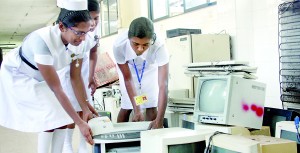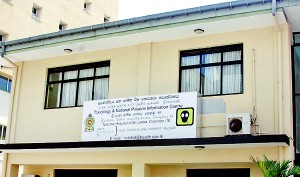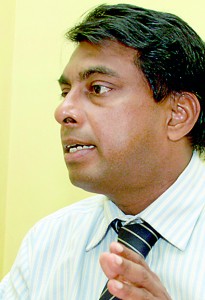News
NHSL leads by example in e-waste collection and disposal
Amidst the treatment and care being provided to patients, there is a different kind of activity taking place at the National Hospital (NHSL) in Colombo these days.
The staff meticulously locating and collecting electronic waste (e-waste), not only from within the hospital, but also from their homes, to be handed over tomorrow (October 28) for proper disposal.

The staff meticulously locating and collecting electronic waste (e-waste). Pix by Indika Handuwala
This is an initiative of the Toxicology & National Poisons Information Centre at the NHSL in collaboration with the Health Ministry to mark National Poison Prevention Week from October 28 to November 3.
“We have moved away from tradition,” says Centre Director and Consultant Physician, Dr. Waruna Gunathilake, explaining that, whereas, earlier the focus was snake-bite, agro-chemicals and prevention of poisoning in homes, the scope has now widened.
E-waste collection from the NHSL and its proper disposal are timely actions, with the theme for the National Poison Prevention Week 2013 being ‘Environment and toxins’, it is learnt.
The correct disposal of e-waste — which could release heavy metals into the environment – is of importance, as they can easily become a health hazard, says Dr Gunathilake, pointing out that it has been hardly discussed in the Health sector, though the Central Environmental Authority (CEA) has been tackling this issue countrywide for some time now.
The e-waste collection at the NHSL being carried out with the full cooperation of its Director Dr Anil Jasinghe, is a “landmark” event in the Health sector, stresses Dr Gunathilake, who is hoping that other hospitals would follow suit.
E-waste comprising waste of electronic and electrical equipment (WEEE) includes any item which has a circuit, such as

Showing the way: NHSL ready to mark Poison Prevention Week from October 28 to November 3
computers, their monitors and accessories, mobile phones and their accessories, telephone equipment, audio and video items, printing devices, electronic surgical items and CFL bulbs and tube lights.
The symbolic handover of NHSL’s e-waste through the CEA, to designated collectors, will take place tomorrow morning. The collectors in turn will recycle it, preventing toxins from being released into the environment, pointed out Dr Gunathilake.
Another event planned by the centre to mark Poison Prevention Week is an exhibition on October 30, just opposite the Outpatients Department (OPD) of the NHSL.
While it is open to the public, Dr Gunathilake said that there would be a special stall where Advanced Level students could get information on toxicology, poisoning statistics as well as patterns and trends, if they intend to focus on this topic as their A/L project.
Meanwhile, the Centre is also making arrangements to collect all discarded agrochemical bottles in collaboration with the industry, in the districts of Batticaloa, Jaffna, Polonnaruwa and Moneragala. “The collection of the empty bottles would be the first step in their proper disposal,” he said.
Recalling the history of the Toxicology & National Poisons Information Centre, Dr Gunathilake lauded Forensic Medicine and Toxicology expert Prof Ravindra Fernando for setting it up 25 years ago. It is considered Southeast Asia’s pioneer in this sphere.

Dr. Waruna Gunathilake
Even though hampered by lack of infrastructure and manpower, the Sunday Times learns that it has received both global and regional recognition, as evidenced by invitations for international meetings being extended to Sri Lanka. The most recent was to the World Toxicology Summit in Las Vegas, United States of America, in early October.While the Centre, through its efforts, has been able to reduce the number of deaths due to poisoning and snake-bites over the years, near-future targets include a launch of their website ‘Sri Lanka Toxbase’ on poison information.
comments powered by Disqus
